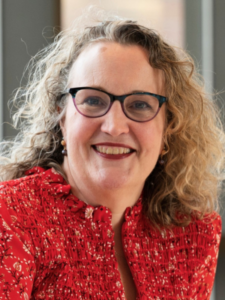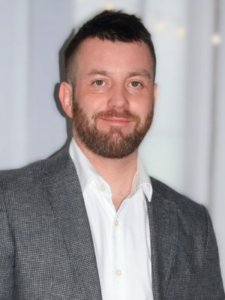Home » About » Governance »
Voting for the election of the post of FPM President is now OPEN
The candidates are:
- Dr Emma Harvey BSc MBBS MRCP FFPM
- Dr Rav Seeruthun BSc MBBS MRCGP MBA FFPM
- Dr Marc Watson BM (Hons) MRCGP FFPM
Candidate statements are published below (in alphabetical order).
You are reminded that Fellows and Members, but not Affiliates, Associates, Honorary Fellows and Honorary Members are eligible to vote in this ballot.
The statements have been prepared by the candidates and do not reflect official FPM views or the current status of FPM. Candidates’ statements and videos are presented as submitted and have not been edited by FPM.
Voting closes at 17:00 (UK time), Thursday 6 June 2024
Dr Emma Harvey
This year I am celebrating 25 years in Pharmaceutical Medicine. When I first joined Pharma from the NHS, I was not quite sure what to expect, and I have been on a journey of discovery for the last quarter century. This speciality has the potential to touch so many patients’ lives, innovate and contribute to health policy, and there is always something new to learn, which is one of the things I find most enjoyable.
Learning and particularly ‘learning your craft’ is something I am passionate about. I started in Pharma when PMST (then HMT) was in its infancy and juggled sitting DPM exams and post-graduate training with family life. If we want to be seen as a credible medical specialty, then it is essential that our members are well-trained. Over the years I have been challenged by KOLs and my peers about joining Pharma and being able to say I have passed the DPM, hold a Certificate of Completion of Training and have a Licence to Practise, has always silenced the doubters.
I wear many hats in my life. As well as being a specialist Pharmaceutical Physician, I am also a mother, wife, carer (my son is severely disabled) and more recently, keeper of chickens! The life lessons I have learned, the project management skills I have developed through trying to maintain a positive work-life balance, have stood me in good stead as I have climbed the ladder of seniority in Pharma, and also meant I can empathise with and support colleagues dealing with family challenges, balancing career changes and demands and the demands of life. I have also learned what I am prepared to fight for and what I am prepared to forego.
Over the years I have taken on roles of increasing seniority, in both UK and global roles, most recently culminating in a role as SVP and Global Head of Medical Affairs for a UK-founded biotech. In that role I sat on the executive committee (the first woman to hold such a position) and also regularly presented to the Board of Directors. Throughout my career, I may have changed companies and changed roles but one constant has been the FPM. I moved from associate member to full member and became a Fellow in 2009. I have been an educational supervisor, have sat on the Board of Trustees and since the beginning, I have been an appraiser for revalidation. Recently I signed up to the mentorship programme to become a mentor. I have also been a member of the Policy and Communications Group and am very proud of establishing, with Marcia Philbin, the Equality, Diversity and Inclusion Forum at FPM so that EDI could take its rightful place as a priority subject for FPM.
EDI is a passion of mine and one of the things I have been lucky enough to do is act as a mentor to other women in Pharma, helping them ‘navigate the matrix’, particularly when it comes to the challenges of being a working mother. I was sad to see the recent blog by Marcia saying how few women put themselves forward for Fellowship recently. That is something that I would like to see change in the coming years, and something that I would champion across the specialty. I would like to set up discussion for a to be able to better understand what stops women from applying to become Fellows, and also learn from the men about why they apply. Is it an issue of time, confidence or not having enough faith in what being a Fellow means? Time for some learning from all of you.
In recent years FPM has had a very strong focus on health policy and developing strong links with the NHS and other bodies, which is excellent. Perhaps now is the time to also foster strong links with the rest of the Pharma industry. FPM has typically left that to the ABPI, yet we are important stakeholders in the future of industry and should have a voice of our own.
The FPM is only as strong as its membership. If we are to really build the specialty then we need to be attracting and retaining Pharmaceutical Physicians who are passionate about the speciality and who can advocate, not only for the company they work for, but also for the specialty. We need members who are trained and credible and engaged with the FPM, not only as the professional body, but also as the accrediting body for professional training, whether CPM, DPM or PMST. I would like to work with you, the members and Fellows, to build your voice within FPM to shape the future of the speciality as well as the future of FPM.

Dr Emma Harvey
Supporting candidate video
Dr Rav Seeruthun
Throughout my career in pharmaceutical medicine, I have remained a staunch supporter of the Faculty. My initial engagement involved enrolling in the Pharmaceutical Medicine Specialist Training program and successfully completing the Diploma in Pharmaceutical Medicine. This journey culminated in my inclusion on the Specialist Register in Pharmaceutical Medicine in 2013 and election as a Trustee in 2023.
I have always held the belief that meaningful change is driven by active participation. During my tenure with the Faculty, I assumed various roles that demonstrated my commitment to this principle. I began as a member of the Trainee’s sub-committee, eventually taking on the role of Chair in 2012. Subsequently, I continued to demonstrate my dedication by becoming a member of the Policy and Communications group, where I later assumed the position of Chair in 2015. In these capacities, my focus was on enhancing the Faculty’s external visibility and ensuring we proactively shaped the future of our specialty.
At its core, our Faculty is dedicated to advancing the practice of pharmaceutical medicine, aiming to drive positive change in the healthcare landscape.
Working alongside the newly elected President, Dr Sheuli Porkess, I believe that my experience in pharmaceutical medicine, coupled with my active involvement and leadership roles within the Faculty, places me in a strong position to stand for your Vice-President complementing Sheuli’s leadership.
We were asked to state one priority that I would focus on during a potential term in office. After gaining 18 years of experience in both large/medium-sized pharmaceutical companies and spending three years at Genentech in San Francisco, I returned to the UK to co-found Health-Equity.AI. I now serve as its Chief Medical Officer, leveraging Artificial Intelligence (AI) and Machine Learning (ML) to address health inequalities.
Hence, I am convinced that the Faculty must be at the forefront of AI and ML’s ethical implementation in healthcare.
We are at a tipping point of technological innovation and AI integration, driving advancements in drug development, patient care, and education. By embracing these transformative technologies, we will stay at the forefront of pharmaceutical medicine, revolutionising the industry for the benefit of patients.
Why this focus? Our broad Faculty membership can offer thought leadership across the spectrum of pharmaceutical medicine.
- Drug Discovery: AI will enhance productivity by speeding up the process of identifying lead compounds. ML, being a subset of AI, will help identify and validate genetic targets for drug development, design novel compounds, and expedite drug development.
- Clinical Trials: AI and ML will help design better trials and in patient recruitment, thereby reducing the time and associated costs.
- Pharmacovigilance: AI and ML will enable more efficient signal detection, improve adverse event monitoring, and enhance risk assessment.
- Regulatory Approvals: by assisting in preparation of regulatory submission documents and helping respond to regulatory queries.
- Health Equity: AI and ML will play a significant role in promoting health equity. It can help identify health inequalities and inform interventions to address these disparities.
- Personalised Medicine: The ability of AI and ML to generate insights from patient data/EMRs can lead to more personalised treatments and improved patient outcomes.
- Copy Review Services: Advanced AI and ML algorithms can process vast amounts of data and learn patterns, relationships, and contextual information present in language, helping simplify the review and signatory process.
I believe a focus on AI and ML over the next three years aligns with the Faculty’s strategic vision and values:
First and foremost, our vision revolves around fostering a culture of continuous learning and professional development. Our industry is evolving rapidly, with new treatments, technologies, and regulatory frameworks emerging constantly. We should aim to lead in this area, equipping our members with the knowledge and skills needed to navigate this changing terrain effectively.
Collaboration is another key pillar of our strategic vision. Our Faculty seeks to forge partnerships with industry leaders, regulatory bodies, academia, healthcare providers, patient groups and patients. This collaborative approach ensures the highest standards and strengthens our position as a thought leader in healthcare.
Furthermore, the Faculty is committed to promoting ethical conduct and integrity, critical in areas such as reducing bias in AI. A leadership position will allow us to uphold the highest ethical standards and advocate for transparency in research and clinical practice, ultimately earning the trust of patients and stakeholders.
In conclusion, by embracing the potential of AI and ML aligned with our vision of evolution, collaboration, and ethical leadership we will further advance our speciality and better healthcare for all.

Dr Rav Seeruthun
Supporting candidate video
Dr Marc Watson
Last year marked my 20 year anniversary as a doctor. The first half of my career as a clinical doctor in the UK, I felt isolated, unsupported, underappreciated and unwell.
When I fortuitously embarked on a career in Pharmaceutical Medicine in 2013 I instantly felt a sense of belonging. Very quickly I entered PMST and my love of the Faculty grew. After experiencing the negativity of two other colleges I was blown away by welcoming nature of the FPM and the sense that we were a collection of unusually happy doctors supported by a professional body that cared about its members.
Due to this I felt an overwhelming sense of connection to the Faculty and as such became a member of the Policy and Communications group for 3 years, delivering on multiple workstreams including reorganising and streamlining the Expert Group network and the 2021 FPM symposium, followed by becoming the Chair of the Ethics & Practice Committee for which I am immensely proud in being one of the key players in having an FPM symposium dedicated to Ethics and Trust in 2022.
As we move into the next FPM presidential cycle I was extremely happy to hear of Sheuli’s priorities and would support all of those as Vice President. As Vice President my top priority would be around member wellbeing.
- It is no secret that I personally have had mental health challenges. In fact, the FPM embraced this fact in 2022 for World Mental Health Day with my Fireside Chat. For me, this was a game changer, with a professional body embracing discussion about mental health and wellbeing.
- Member wellbeing isn’t just about mental health though. It encompasses how we feel as members personally, and how we feel about the FPM itself. Whilst I have a unbreakable bond to the FPM, I have heard about a growing disconnect between members and the faculty. This is despite wonderful standalone events in mental health and equality, diversity and inclusion.
As such, as Vice President, my one priority would be realised by creating and implementing a strategic plan for member wellbeing across the FPM strategy. For every strategic pillar/ objective/ activity we should be thinking about wellbeing…. This is my goal. It must become embedded.
What makes me qualified? I don’t know… I’m passionate about the Faculty, but also passionate about change. I have extremely good relationships with the Faculty but also feel I can reach the members as someone who is available emotionally. There is no doubt that I am less experienced compared to previous VPs, but I have a different focus and would complement the new president in the modernisation of the Faculty.

Dr Marc Watson
